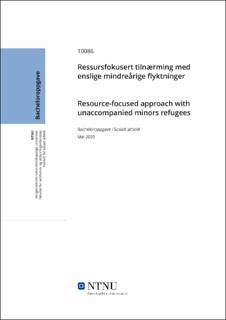Ressursfokusert tilnærming med enslige mindreårige flyktninger
Bachelor thesis
Permanent lenke
https://hdl.handle.net/11250/2785630Utgivelsesdato
2020Metadata
Vis full innførselSamlinger
- Institutt for sosialt arbeid [1393]
Sammendrag
Temaet i denne oppgaven er ressursfokusert tilnærming i arbeidet med enslige mindreårige flyktninger. Dette er en gruppe som bli ansett som sårbare, men har som alle andre barn og unge, håp og ressurser. I denne oppgaven har jeg brukt litteraturstudie som metode. Oppgaven fokuserer på ungdommenes sine ressurser og hvordan miljøterapeuten kan legge til rette for å styrke disse. Problemstillingen ble da som følger: Hvordan kan miljøterapeuten fremme resiliens i arbeid med traumatiserte enslige mindreårige flyktninger i bofellesskap? Selv om oppgaven er ressursfokusert, er det viktig å ha med seg kunnskap om traumebevisst omsorg i møte med traumeutsatte barn og unge. Det er spesielt viktigheten av en trygg relasjon og endring innenfor toleransevinduet som er en forutsetning for å kunne utøve ressursfokusert tilnærming. Innenfor resiliens-teori blir begreper som mestring, beskyttelsesfaktorer, empowerment og psykososialt arbeid satt søkelys på. Jeg har brukt Bronfenbrenners bioøkologiske modell for å se på den gjensidige påvirkningen av barnet og miljøet, samt læring i nærmeste utviklingssone som kjernen i barns utvikling. Teori rundt brobygging både når det gjelder fortid og nåtid, samt i forhold til relasjoner, har vært en viktig del for å fremme resiliens. Ved å bygge en bro mellom fortid og fremtid, gir det mulighet for opplevelse av kontinuitet, mens relasjoner vil kunne gi flyktningbarna sosial kapital som kan opptre som ressursfaktorer i livene deres. Videre går oppgaven inn på miljøterapeutisk arbeid i bofellesskapet som kan styrke enslige mindreårige flyktningers resiliens. Det trekkes frem blant annet det å navigere sammen, legge til rette for læring, bofellesskapets fellesskap og hvordan fysisk mestring kan gi mental styrke. Avslutningsvis knyttes oppgaven sammen og jeg vil tillegg komme med noen egne refleksjoner. The theme of this thesis is resource-focused approach in working with unaccompanied minor refugees. This is a group that is considered vulnerable. However, like all other children and youth they have resources and hopes. This thesis will highlight the resources and how the social therapist can positively affect these. The research question is as following: How can the social therapist promote resilience in working with traumatized unaccompanied minor refugees in shared housing? Although this thesis is resource-focused, it is also important to include knowledge of trauma-informed care when working with trauma-prone children and youth. To apply a resource-focused approach, it is especially important to maintain a safe relationship and change within the tolerance window. Within the theory of resilience, concepts such as mastery, protection factors, empowerment and psychosocial work are considered. I have used Bronfenbrenner’s bioecological model to highlight the mutual effect of the child and the environment, as well as the concept of learning in the nearest development stage as the core of children's development. Theory of bridge-building both in the past and the present, as well as in terms of relationships, has been an important part of promoting resilience. By building a bridge between the past and the future, it allows the children the possibility of experiencing continuity. Furthermore, relationships will be able to provide the refugee children with social capital that can act as resource factor in their lives. This thesis also looks at how social therapeutic work in shared housing can strengthen resilience; navigating together, facilitating learning, the feeling of community in shared housing, and physical mastery can play an important role in mental strength. Finally, the findings in this analysis is complemented by my own reflections.
